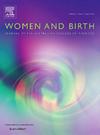Factors and interventions that positively influence breastfeeding rates at six months postpartum: An integrative literature review
IF 4.4
2区 医学
Q1 NURSING
引用次数: 0
Abstract
Background
Despite the health benefits of breastmilk, many women discontinue breastfeeding prior to six months postpartum. Previous work from 2010 has identified women’s breastfeeding intention, self-efficacy, and support as the main modifiable factors that influence breastfeeding at six months postpartum. However, due to societal changes during the past decade, factors influencing women’s decision to continue breastfeeding requires further exploration.
Aim
To determine “what modifiable contemporary factors and interventions can positively influence women’s decision to continue breastfeeding until six months postpartum?”
Method
An integrative literature review was conducted based on Whittemore and Knafl’s framework. Databases were searched using combinations of the following main key words: breastfeeding, duration, factors, and interventions. Studies addressing the research question and published in English language since 2010 were included. Interventional studies were limited to only randomised controlled trials.
Results
Women's positive breastfeeding intention, self-efficacy, and support remained the key modifiable factors that could increase breastfeeding rates up to six months postpartum. The main effective interventions included education support or counselling when they targeted women’s needs, intention, self-efficacy and support; and were held over multiple sessions commencing antenatally or immediately after birth. Contemporary effective strategies included digital communications such as phone calls, virtual meetings and messaging via social media including FacebookTM, WhatsAppTM and TelegramTM. Main conceptual frameworks were motivational interviewing, planned behaviour theory and cognitive behavioural therapy.
Conclusion
Interventions that support breastfeeding up to six months should include contemporary strategies that target the main modifiable factors and are tailored based to women’s needs and their sociocultural influences.
求助全文
约1分钟内获得全文
求助全文
来源期刊

Women and Birth
NURSING-OBSTETRICS & GYNECOLOGY
CiteScore
7.20
自引率
13.20%
发文量
371
审稿时长
27 days
期刊介绍:
Women and Birth is the official journal of the Australian College of Midwives (ACM). It is a midwifery journal that publishes on all matters that affect women and birth, from pre-conceptual counselling, through pregnancy, birth, and the first six weeks postnatal. All papers accepted will draw from and contribute to the relevant contemporary research, policy and/or theoretical literature. We seek research papers, quality assurances papers (with ethical approval) discussion papers, clinical practice papers, case studies and original literature reviews.
Our women-centred focus is inclusive of the family, fetus and newborn, both well and sick, and covers both healthy and complex pregnancies and births. The journal seeks papers that take a woman-centred focus on maternity services, epidemiology, primary health care, reproductive psycho/physiology, midwifery practice, theory, research, education, management and leadership. We also seek relevant papers on maternal mental health and neonatal well-being, natural and complementary therapies, local, national and international policy, management, politics, economics and societal and cultural issues as they affect childbearing women and their families. Topics may include, where appropriate, neonatal care, child and family health, women’s health, related to pregnancy, birth and the postpartum, including lactation. Interprofessional papers relevant to midwifery are welcome. Articles are double blind peer-reviewed, primarily by experts in the field of the submitted work.
 求助内容:
求助内容: 应助结果提醒方式:
应助结果提醒方式:


